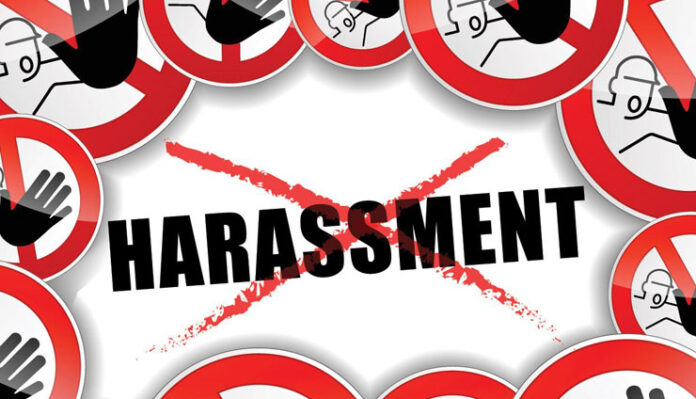Harassment involves sexual, physical, or other abusive behaviours that individuals experience at the workplace. All this is illegal. Every firm is encouraged to devise reasonable measures to ensure the workplace is free from harassment. If you experience workplace harassment, it is vital to seek the help of an experienced lawyer from a law firm.
Harassment can involve bullying, where an employee is harassed at work. This involves an individual behaving unreasonably towards another employee. The behaviour can cause a risk to safety and health. It doesn’t matter if the individuals who are harassing intended to harass the victim. Bullying is repeated unreasonable behaviour towards an individual.
These Unreasonable Behaviors Include:

- Constant threats to demote or sack
- Setting unattainable timelines
- Constant unjustified complaints or criticism
- excluding an individual from workplace activities
- Arbitrary and inconsistent enforcement of rules
- Verbal abuse
- Physical assault
- Setting unattainable tasks
- Changing work arrangements to inconvenience someone deliberately
- Withholding materials or information to perform work
- Taking credit for someone else work without accrediting the person

Some behaviours may constitute criminal offences. These behaviours include unwanted damage or physical contact. If you experience such behaviours, you can consult an employment lawyer. Almost everyone experiences workplace hostility. At some point, workplace hostility may constitute workplace harassment legally. For a harassment lawsuit to be a success, you must prove in court the following
- The conduct was unwelcoming and offensive
- The harassment was based on gender, sex, race
- The harassment was pervasive and severe enough to create a hostile work environment
When dealing with your case, an attorney will check for these kinds of workplace harassment
Verbal

This includes off-colour remarks, slurs, jokes, or other comments that attack a status. Verbal harassment victims face continuous intimidation that threatens their careers and health.
Verbal harassment includes offensive gestures, demeaning slurs, and unwanted criticism. This nonphysical violence includes hurtful comments, body shaming jokes, and unwanted taunting. Leaders and HR managers should be able to notice such kinds of behaviours.
Physical
Groping, hitting, pushing, and any other unwanted physical contracts.
Physical harassment includes physical assaults, improper touching of skin and clothing. It also includes damaging property and threats. Individuals that belong to gender minorities are likely to experience this form of harassment at work. Employees must take strict action if a situation turns violent and file a complaint against the offenders.
Sexual

It involves a repeated request for sexual favours, dates, and other unwanted sexual behaviours. It occurs when the employer offers employment benefits in exchange for sexual favours. Workplace sexual harassment is a heinous crime, and it happens more often. The offence is not specific to women. An individual of any gender can be a victim of sexual harassment. Signs of sexual harassment include asking for sexual favours and unwanted touching. It also includes sending obscene videos and messages, comments such as vulgar gestures, and much more. Many times such incidents go unreported or unnoticed. Many victims fail to speak about it as they think things will improve, but it worsens with time. One must report someone who makes them feel uncomfortable or a sex offender.
Psychological Harassment
Psychological harassment consists of behaviours such as withholding information. Victims who face psychological harassment suffer from low self-esteem and mental breakdown. They also often undermine themselves. Psychological harassment includes making impossible demands and taking credit for someone else achievement.
It also includes imposing an impossible deadline. This is also considered psychological bullying.
Visual
Drawings, posters, photographs, and cartoons can be examples of visual harassment.
The court will assess whether your case is serious enough to constitute workplace harassment. The court will determine the length of time and the frequency at which the behaviour occurred. The law doesn’t require the victim to be a direct target of the bullying. If your employer knew of the harassment and didn’t take action, they could be liable.
Why You Should Report Workplace Harassment

Reporting cases of workplace harassment is vital, as other similar cases might have been reported. Your perpetrator might have bullied other people, and they chose either to report or not report it. Most firms have policies for reporting workplace harassment. If no one has reported it yet, it’s important to notify the firm’s Hr.
What To Avoid When You Face Workplace Harassment
You should avoid this behaviour when dealing with workplace harassment,
Don’t keep quiet
You should report bullying or harassment, which should be handled appropriately. Remaining quiet will not make the harasser’s behaviour change. All cases of harassment should be reported, and complaints investigated thoroughly.
Don’t complain to co-workers
Telling your coworkers about the situation will not change anything. It is also important to know your colleague’s relationship with the offender. You might not know how they feel about the offender.
Don’t retaliate

Retaliation may make the matter worse or escalate the issue. Instead of escalating issues, let the management handle it from there.
Legal Remedies for Workplace Harassment
Workplace bullying mostly goes unreported. This is usually because most employees fear losing their job through reporting cases of harassment. Therefore, it is important to notify the HR department if the harassment causes issues in the workplace. No one deserves to be mistreated or bullied. Examples of workplace legal remedies include
- The bully has been disciplined or reprimanded by the employer for their action
- Recovering emotional distress damages through a lawsuit
- A court order demanding the employer to institute new policies in the company
- If the harassment caused a lost wages or job, the victim may get their job back and the pay.
When dealing with severe or ongoing treatment, or when an employer fails to address the issue properly, seeking legal support can be important.
This is where Employment Attorneys Minneapolis, or elsewhere, can help protect employee rights as well as aid victims understand their options, build a strong case, and pursue the appropriate legal remedies to achieve justice and a safe working environment.
Do You Need A Lawyer For Workplace Harassment?

If you are experiencing workplace harassment, you should consult an experienced workplace attorney. A lawyer will assist you in understanding your options and obligations. This is according to the laws regarding discrimination and workplace harassment. Your employment lawyer will also represent you in court when needed. Filing a harassment claim can be daunting. But having a lawyer to assist throughout the entire process could help you deal with the situation confidently.
.







